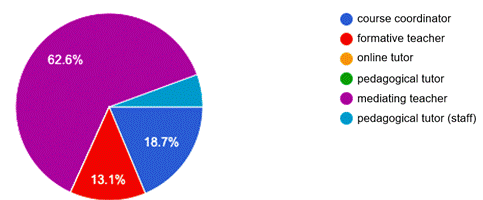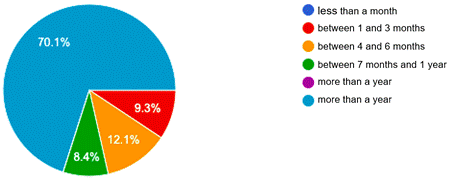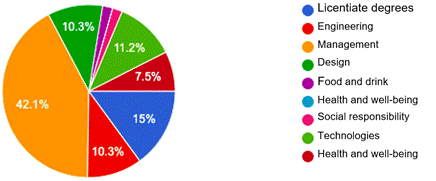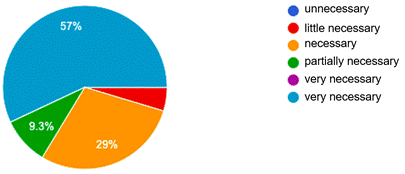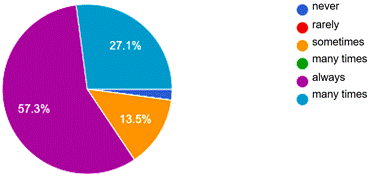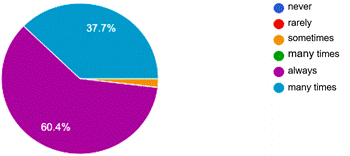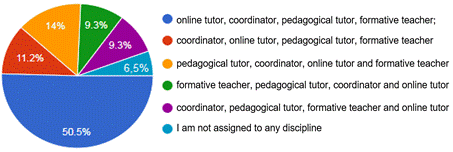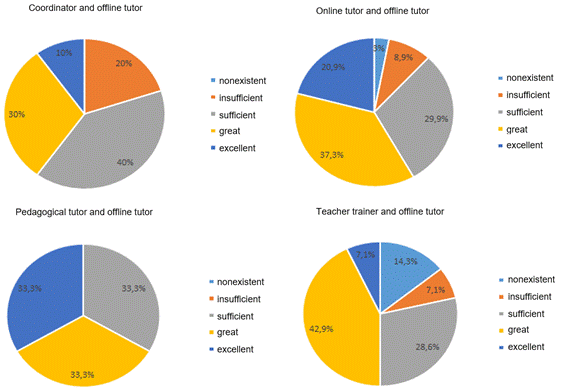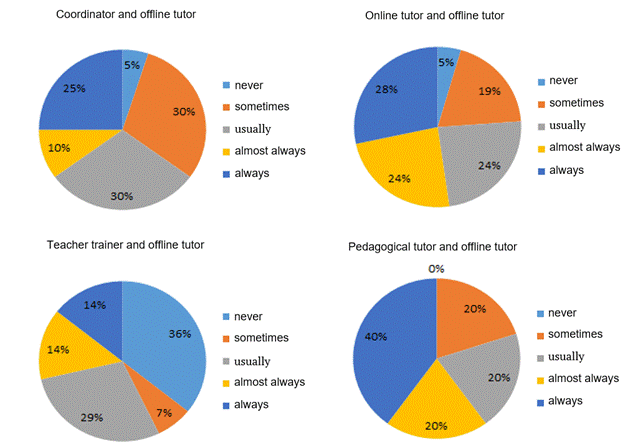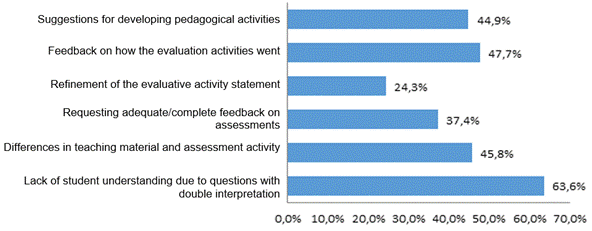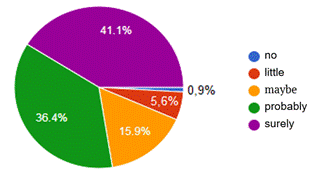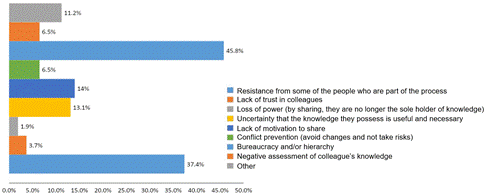Serviços Personalizados
Journal
Artigo
Compartilhar
Acta Scientiarum. Education
versão impressa ISSN 2178-5198versão On-line ISSN 2178-5201
Acta Educ. vol.46 no.1 Maringá 2024 Epub 01-Mar-2024
https://doi.org/10.4025/actascieduc.v46i1.61972
TEACHERS' FORMATION AND PUBLIC POLICY
The process of knowledge sharing in EaD undergraduate courses: an analysis of the intra and intersector relationship
1Programa de Pós-Graduação em Gestão do Conhecimento nas Organizações, Centro Universitário de Maringá, Av. Guedner, 1610, 87050-900, Maringá, Paraná, Brasil.
Increasingly, the importance of communication and adequate sharing of information between the different agents that build learning content is being detected. Otherwise, knowledge may reach students in a fragile and/or segmented way, through different channels, such as classes, teaching material, and virtual learning environments, among others. This study has the general objective of analyzing the communication process within and between sectors of undergraduate courses in the Distance Education (DE) modality of a private Higher Education Institution (HEI) in the state of Paraná. The research is of an applied nature with a quantitative approach and, to meet the proposed objectives, an online questionnaire was applied to employees from different sectors of the HEI in the case study, with a subsequent statistical analysis of the data collected and with the support of the Google Forms tool. The result of the analysis is an overview of the communication and knowledge-sharing processes of this HEI, identifying that offline tutoring professionals and other professionals (coordinator, pedagogical tutor, online tutor, and teacher trainer) should seek to be in synergy during the closing of each of the disciplines, as well as with the effectiveness of the activities made available to students so that the continuous refinement of these materials can be promoted.
Keywords: knowledge cycle; distance education; communication process
Cada vez mais, detecta-se a importância de comunicação e compartilhamento adequado das informações entre os diferentes agentes que constroem conteúdos de aprendizagem. Caso contrário, o conhecimento pode chegar de forma fragilizada e/ou segmentada aos discentes, por meio dos diferentes canais, como aulas, material didático, ambiente virtual de aprendizagem, dentre outros. Este estudo tem o objetivo geral de analisar o processo de comunicação intra e entre setores de cursos de graduação na modalidade de Educação a Distância (EaD) de uma Instituição de Ensino Superior (IES) privada no estado do Paraná. A pesquisa é de natureza aplicada com abordagem quantitativa e, para atender aos objetivos propostos, foi aplicado um questionário on-line junto aos colaboradores dos diferentes setores da IES do estudo de caso, com uma posterior análise estatística dos dados coletados e com apoio da ferramenta Google Forms. O resultado da análise é um panorama sobre os processos de comunicação e compartilhamento do conhecimento dessa IES, identificando que os profissionais da tutoria off-line e os outros profissionais (coordenador, tutor pedagógico, tutor on-line e professor formador) devem procurar estar em sinergia durante o fechamento de cada uma das disciplinas, bem como com a efetividade das atividades disponibilizadas para os discentes, a fim de que se possa promover o refinamento contínuo desses materiais.
Palavras-chave: ciclo do conhecimento; educação a distância; processo de comunicação
Cada vez se detecta más la importancia de una adecuada comunicación e intercambio de información entre los diferentes agentes que construyen los contenidos de aprendizaje. De lo contrario, el conocimiento puede llegar de forma debilitada y/o segmentada a los alumnos, a través de los diferentes canales, como las clases, los materiales didácticos, el entorno virtual de aprendizaje, entre otros. Este estudio tiene como objetivo general analizar el proceso de comunicación dentro y entre sectores de los cursos de pregrado en Educación a Distancia (ED) de una Institución de Educación Superior (IES) privada del estado de Paraná. La investigación es de carácter aplicado con enfoque cuantitativo y, para cumplir con los objetivos propuestos, se aplicó un cuestionario online con los empleados de los diferentes sectores de la IES del caso de estudio, con un posterior análisis estadístico de los datos recogidos y con apoyo de la herramienta Google Forms. El resultado del análisis es una visión general sobre los procesos de comunicación e intercambio de conocimientos de esta IES, identificando que los profesionales de la tutoría offline y los demás profesionales (coordinador, tutor pedagógico, tutor online y formador de profesores) deben buscar estar en sinergia durante el cierre de cada una de las disciplinas, así como con la eficacia de las actividades puestas a disposición de los alumnos, de manera que se pueda promover el perfeccionamiento continuo de estos materiales.
Palabras clave: ciclo de conocimiento; educación a distancia; proceso de comunicación
Introduction
Among the different approaches to human development that are currently known, it becomes apparent that knowledge is present in various spheres of people’s social and subjective lives, enabling the advancement of society as a whole (Feitosa, 2015). Understanding how this knowledge consolidates from these realities provides a concrete framework for understanding the evolution of the organizations that make up society. Knowledge Management (KM), in this sense, comes into play as a tool and/or practice that contributes to the development of organizational culture through strategies that allow for the extraction, management, and manipulation of knowledge present in the agents that integrate the organization’s environment (Nunes, 2013). Dalkir (2017) emphasizes that, although there is no general definition of KM, professionals in the field mostly agree that the objective of KM is to add value to the organization.
Without adequate communication and sharing of information among the agents of Distance Education (DE) who construct learning content - tutors, teachers, educational designers, and coordinators - knowledge can reach students in a weakened and/or fragmented manner through existing channels such as classes, educational material, the Virtual Learning Environment (VLE), and contact with teachers, as indicated by Schuelter (2010) and Nunes (2013).
In this aspect, knowledge sharing comes to the forefront as an intangible asset that contributes to the evolution of the organization as a whole (Choo, 2006), by providing support for the construction of communication processes within organizations. When discussing organizational culture, the relationship between the agents that comprise the organization and the relevance of the socialization of the knowledge that each agent possesses, which allows for the progress of organizational culture, is implied (Dalkir, 2005). For the present research, knowledge sharing is understood as the action of converting tacit knowledge into explicit knowledge, as well as following the theory of Takeuchi and Nonaka (2008).
Considering different organizations, institutions offering Distance Education (DE) have stood out for presenting structured and organized teaching in accordance with the advent of information and communication technologies (Brazil, 2007). However, for DE teaching to effectively flourish, there needs to be coordination among the sectors that plan, create, and provide content for students, who are seen as the final agents of the system (Lenzi, 2014).
At the core of the proposal of the object of study of this research, the agents that integrate Distance Education (DE) are distinguished, divided into face-to-face and distance tutoring, course coordination, content teachers, materials team, and administrative staff - based on the definitions present in the quality document of DE (Brazil, 2007). Thus, the Higher Education Institution (HEI) of the case study presents the following organization for its collaborators:
Offline tutoring, comprised of:
offline tutor: responsible for correcting activities and providing feedback to students through the online platform;
manager: responsible for managing the offline tutor team in the development of their activities; and
supervisor: responsible for maintaining the standard of quality and performance of the offline tutors’ work.
Agents of course coordination, comprised of:
manager: responsible for managing the offline tutor team in the development of their activities;
coordinator: responsible for the undergraduate course, as well as for the entire political-pedagogical project and teaching plan;
formative teacher: responsible for teaching classes and creating assessment activities;
online tutor: responsible for direct communication with the student, addressing doubts regarding the content provided by the courses; and
pedagogical tutor: provides assistance to the coordinator in the development of course strategies and attends to students with operational issues.
Through the assistance of offline tutors, students receive support for resolving operational and pedagogical issues, becoming active participants in the pedagogical practice (Brazil, 2007). A successful execution of processes implies intrasectoral synergy, meaning the execution of activities carried out by offline tutors enables knowledge sharing and, consequently, the resolution of adversities that arise throughout the processes.
The relationship between sectors focuses on sharing between offline tutors and course coordination agents, namely course coordinators, online tutors, pedagogical tutors, and formative teachers. Communication among these agents and offline tutors determines the smooth operation of communication processes within the institution, facilitating seamless communication (Bentes, 2009). In this sense, Moresi and Mendes (2010) assert that knowledge sharing in the organizational environment is directly related to organizational culture and intellectual capital management.
Regarding the above, it is worth noting that the general objective of this research was to analyze the communication processes and knowledge sharing among professionals in Distance Education (DE) who develop content, activities, and assessments, as well as professionals responsible for correcting and providing feedback to students. In Calvi (2019), an analysis of the intra- and inter-sectoral relationships is presented. This article focuses on presenting an analysis of the communication and knowledge-sharing process between offline tutors and course agents.
Methodology
The research is applied with a quantitative approach (Santos, 2005; Fleury & Werlang, 2016). To meet the proposed objective, descriptive-exploratory research was conducted at a Higher Education Institution (HEI) for the case study (Sampieri, Collado, & Lucio, 2006; Gil, 2010; Fleury & Werlang, 2016). The research is descriptive-exploratory because there are gaps regarding the delineation of DE communication processes and how the system’s structure contributes to the sharing among its professionals.
Because it is an investigation involving the participation of active subjects in the HEI of the case study, it is emphasized that it was necessary to ensure the standards and ethical rules of the research. Therefore, the methodological proposal, the methodological procedures, and the research instrument were submitted for evaluation by an Ethics and Research Committee, approved under the number CAAE: 18189119.2.0000.5539. Following the research approval by the Ethics Committee, a pre-test involving a small portion of offline tutors and course coordination agents was conducted. It is noted that the responses obtained in the pre-test were validated and subsequently published in a scientific congress (Calvi, Almeida, & Dal Forno, 2020).
Data collection was conducted through an online questionnaire, with the assistance of the Google Forms platform, to understand the knowledge-sharing process among agents in the offline tutoring sector, as well as among course coordination agents at the Higher Education Institution (HEI).
The sample size collected was 107 respondents, aiming to achieve a 5% margin of error and have a 90% confidence level. The responses to the questions are multiple-choice, dichotomous, or on a Likert scale. For Likert scale responses, weights were calculated through weighted average, where the weight assigned to each response is presented in Table 1.
Table 1 Likert scale for questions.
| Weight | Meaning of the Proposition | |
| 1 | unnecessary, never, non-existent | |
| 2 | little necessary, sometimes, insufficient | |
| 3 | necessary, normally, sufficient | |
| 4 | partially necessary, almost always, most of the time, excellent | |
| 5 | very necessary, always, excellent |
Source: adapted from Cunha (2007).
Next, for responses on the Likert scale, an attempt was made to determine the level of satisfaction/adherence of the respondents, according to the specified range of values in Table 2.
Finally, the data was analyzed, and a proposal was developed to enhance the communication and sharing system among DE agents.
Results and discussion
The structure of the questionnaire applied to coordinators, tutors, pedagogical tutors, and formative teachers consists of eighteen objective questions available on the Google Forms platform, in 2019, with a more homogeneous sample. The questionnaire was configured to ensure the confidentiality of respondents and was sent via email. Table 3 presents the sample size, margin of error, and confidence level obtained; following this section, the collected data and their interpretation are presented through quantitative analysis.
Information regarding ‘work experience, area of expertise, and training and qualifications’ was obtained through questions 1, 1.1, 2, 3, 3.1, and 4, as shown in Table 4. It is noted that the questions inquire about the role of the agents, their tenure at the institution, their area of expertise, and the training and qualifications received.
Figure 1 presents the responses to question 1; however, the number of participants who responded to the questionnaire was 20 (18.7%) coordinators out of a total of 27 employees in the institution; 6 (5.6%) pedagogical tutors out of a total of 17 employees in the institution; 14 (13.1%) formative teachers out of a total of 102 employees in the institution; and 67 (62.6%) online tutors out of a total of 129 employees in the institution.
Table 2 Range of values to determine the level of satisfaction/adherence to the problem presented.
| Value range | Level of satisfaction/adherence |
| Superior to 3.6 | Strong |
| Between 2.6 e 3.5 | Medium |
| Inferior to 2.5 | Weak |
Source: prepared by the authors.
Table 3 Sample data.
| Population | 96 Offline Tutors | 275 professionals |
| Sample | 77 Offline Tutors | 107 agents |
| Sampling error | 5% | 5% |
| Confidence level | 98% | 90% |
Source: prepared by the authors.
Table 4 Working time, area of activity, training, and qualifications.
| 1. | What is your role at the IES? | |
| 1.1 | How long have you worked at the institution? | |
| 2. | What is the major area of the course in which you work? | |
| 3. | Did you undergo any specific training to work in your activity? | |
| 3.1 | If YES, did the training and qualifications provided meet your needs to carry out your tasks? | |
| 4. | Are periodic improvements (i.e., lectures and workshops) relevant to you? |
Source: prepared by the authors.
In Figure 1, there is a low participation rate of formative teachers in the survey: only 13.1% of respondents, out of a total of 102 formative teachers. This may be an initial indication of their involvement and participation in the communication process, considering that the work regime of formative teachers differs from the other surveyed agents, as they are less frequently present in the DE sector. However, their role in developing activities and preparing classes is crucial for the student’s learning process.
It is worth noting that the number of professionals is linked to the specific demands that each of them assumes in the institution. Therefore, the number of formative teachers and online tutors is proportional to the number of students in each course. Hence, if a course accommodates two thousand enrolled students, it will have a higher number of online tutors and formative teachers available to students compared to a course with five hundred enrolled students.
Figure 2 presents the responses to question 1.1, which aims to discover how long the agents have been working at the institution. It can be observed that the percentages in this graph show that 70.1% of the agents have been working at the institution for more than one year. This data indicates that the respondents have experience in their roles and a clear understanding of the communication process, contributing to the research results.
Figure 3 presents the responses to question 2, demonstrating strong participation from agents in all areas of knowledge at the institution. The number of respondents by area was: 16 (7.5%) agents from the education field; 11 (10.3%) agents from the engineering field; 45 (42.1%) agents from the management field; 11 (10.35%) agents from the design field; 2 (1.9%) agents from the food and beverage field; 8 (7.5%) agents from the health and wellness field; 12 (11.2%) agents from the technology field; 2 (1.9%) agents from the social responsibility field. It is noteworthy that this graph shows a diversification of respondents, indicating good participation from all areas of the research.
Next, the dichotomous questions 3 and 3.1 aim to verify whether: (i) the agents underwent any specific training/qualification before performing their duties; and (ii) they meet the needs for carrying out their activities. For question 3, it was noted that 73 agents (68.2%) underwent specific training. Following this, question 3.1 emphasizes that 69 agents (84.1%) indicated that these training/qualifications contributed to the execution of their tasks. Thus, the importance of undergoing specific training is evident, allowing individuals to experience the practice of tasks that will be performed.
The responses to question 4 indicate the relevance of periodic improvements (workshops, lectures, and workshops) for course agents. As shown in Figure 4, it is highlighted that 57% correspond to 61 respondents; 29% correspond to 31 respondents; 9.3% correspond to 10 respondents; and 4.7% correspond to 5 respondents. Following the parameters presented in Table 2, the value of 3.81 is reached, indicating a strong level of satisfaction/adherence from the agents regarding the conducted training sessions; it also demonstrates the awareness of periodic improvements by the agents involved in the courses.
Information regarding ‘the relationship between agents for problem-solving and pedagogical adversities during the development of activities’ was obtained through questions 4, 5, 5.1, 6, and 6.1, as presented in Table 5.
Questions 5 and 5.1 respectively verify if the employees have faced difficulties in performing their tasks due to a lack of knowledge about the subject to be assessed; also, if they request assistance from a colleague to solve them. The results of question 5 indicate that 87% of employees (81.3%) have faced pedagogical adversities.
Figure 5 presents the responses to question 5.1; it is emphasized that 57.3% correspond to 55 respondents; 27.1% correspond to 26 respondents; 13.5% correspond to 13 respondents; and 2.1% correspond to 2 respondents. According to the parameters presented in Table 2, the value of 3.92 indicates a strong level for solving adversities that arise among employees.
Figure 6 presents the responses to question 6, which seeks to understand if employees can define a strategy after receiving help from other colleagues. It is noted that 60.4% correspond to 64 respondents; 37.7% correspond to 40 respondents; and 1.9% correspond to 2 respondents. According to the parameters presented in Table 2, the value of 4.54 indicates a strong level of strategy definition for problem-solving.
Table 5 Relationship between agents to solve problems and pedagogical adversities.
| 5. | Have you ever faced any pedagogical adversity due to a lack of knowledge about the subject to be worked on (for example, the student’s lack of understanding of the assessment activities to be carried out)? |
| 5.1 | If YES, do you request support/help from your colleague(s) in the area to discuss the topic? |
| 6. | After the support received by one of the professionals, are you able to define a strategy for the successful completion of the pedagogical activity? |
| 6.1 | Which professionals do you turn to most when pedagogical difficulties/questions arise in the subjects you are responsible for? |
Source: prepared by the authors.
From these results, it is observed that there is collaborative work among the agents in the course coordination sector. This collaborative activity is linked to the concept proposed by Takeuchi and Nonaka (2008), Nunes (2013), Cheng and Lee (2016), among other authors, who indicate that collaborative work contributes not only to the creation of intellectual capital but also to the development of individuals within teams.
Question 6.1 aims to discover which professionals the course agents turn to for problem-solving. In Figure 7, it is noted that the online tutor (50.5%) is the most requested for problem-solving, followed by the coordinator (11.2%) for issue resolution. This is indicative that the online tutor is capable of solving certain problems. However, not all issues can be resolved by the online tutor alone; the support of other professionals involved is necessary. The pedagogical tutor (14%) emerges third in the hierarchical line, followed by the formative teacher (9.3%), responsible for question development.
Information regarding ‘the relationship between course agents and offline tutors’ was obtained through questions 7, 8, 9, 10, 11, and 12, as presented in Table 6.
Question 7 seeks to determine how agents classify knowledge sharing between them and offline tutors. The percentages for this question show that 39 agents (36.4%) classified it as excellent; 34 agents (31.8%) as sufficient; 19 agents (17.8%) as good; 11 agents (10.3%) as insufficient; and 4 agents (3.7%) as nonexistent. According to Table 2, the value of 3.54 indicates a medium level, thus it can be stated that knowledge sharing occurs between agents and offline tutors. By further observing question 7 and considering the professionals - course coordinator, online tutor, pedagogical tutor, and formative teacher - individually, it is possible to analyze the type of relationship each of them has with the offline tutor. Thus, out of a total of 107 respondents in the survey: 20 (18.69%) are coordinators; 67 (62.61%) are online tutors; 14 (13.1%) are formative teachers; and 6 (5.6%) are pedagogical tutors. Furthermore, Figure 8 demonstrates that it is possible to establish classification percentages of sharing between the relationship of offline tutors with coordinators, online tutors, formative teachers, and pedagogical tutors. Therefore, according to Table 2, the following is analyzed:
Coordinators: The value of 3.30 indicates a medium level, therefore, knowledge sharing should be enhanced, and the relationship between offline tutors and coordinators can be improved. One suggestion would be to encourage sharing meetings between offline tutors and coordinators to discuss pedagogical challenges faced during assessments, as well as for course development strategies;
Online tutors: The value of 3.64 indicates a strong level. Therefore, there is good knowledge sharing between offline tutors and online tutors;
Formative teachers: The value of 3.21 indicates a medium level, showing a sharing that could be enhanced between offline tutors and formative teachers;
Pedagogical tutors: The value of 4.0 indicates a strong level. Thus, there is good sharing among these professionals.
All these data on the classification of knowledge sharing align with what Wiig (1999), Ipe (2003), and Lin (2007) emphasize: the accumulation of knowledge and its accessibility is one of the main functions of conscious knowledge organization; when there is an incentive to share, everyone benefits.
Table 6 Relationship between course coordination agents and the offline tutor.
| 7. | How do you consider sharing knowledge between you and the offline tutors, responsible for correcting the subjects on your course? | |
| 8. | Regarding pedagogical difficulties/doubts, does the offline tutor discuss the topic to be evaluated and/or inconsistencies and pedagogical difficulties of students? | |
| 9. | Think about the times when the offline tutor asked for help to resolve pedagogical difficulties/questions. Have they been resolved? | |
| 10. | Regarding the results of student assessments, what pedagogical problems would you like to be notified about? | |
| 11. | Do you believe that the subject contents can be enhanced if there is greater sharing of knowledge between you and the subject's offline tutor? | |
| 12. | In your perception, is there monitoring and interest from the teacher trainer of your course to check the level of performance of students concerning the activities carried out by them? |
Source: prepared by the authors.
Question 8 seeks to understand if the offline tutor requests the participation of course agents to discuss pedagogical difficulties/doubts. It is observed that the overall percentages of the questions show that 27 agents (25.7%) discuss inconsistencies and/or pedagogical difficulties; 27 agents (25.7%) usually; 21 agents (20%) almost always; 21 agents (20%) sometimes; and 9 agents (8.6%) never. According to the parameters presented in Table 2, the value of 3.28 indicates a medium level for the frequency with which the offline tutor seeks course agents to discuss pedagogical difficulties. It is emphasized that the relationship of the offline tutor with each of the agents is different when analyzed separately. Therefore, according to the data in Figure 9 and Table 2, the following information is obtained:
Offline tutors and coordinators: The value of 2.95 indicates a medium level, and the relationship can be enhanced for discussing adversities;
Offline tutors and online tutors: The value of 3.52 indicates a medium level, and the relationship between these tutors can be facilitated and improved;
Offline tutors and formative teachers: The value of 2.64 indicates a medium level. There is also a relationship for problem-solving, but it could be enhanced;
Offline tutors and pedagogical tutors: The value of 3.33 indicates a medium level, and there is a good relationship between them, which, however, could be improved.
Upon analyzing this data, it is concluded that the relationship of sharing and exchanging experiences in the development of activities can be worked on and encouraged by the HEI, aiming for this exchange to become more frequent and, consequently, improve everyone's experience with the communication process, as advocated by the works of Nunes, Pacheco, Nakayama, Melo, and Rissi (2011) and Bento (2016).
Question 9 aims to verify if, when the offline tutor requested help from the course agents - coordinator, online tutor, pedagogical tutor, and formative teacher - the situation was resolved. It is noted that 71 respondents (66.4%) indicate ‘always’; 22 respondents (20.6%) indicate ‘most of the time’; 10 respondents (9.3%) indicate ‘usually’; and 4 respondents (3.7%) indicate ‘never’. According to Table 2, the value of 4.46 indicates a strong level of the frequency with which problems were solved when the offline tutor sought help from any of the course collaborators.
In Figure 10, it is observed that adversities are resolved when shared. This not only ensures the prevention of problems but also integrates essential sectors for the elaboration and development of materials, classes, and activities that students receive. In this sense, the works of Lin (2007) and Takeuchi and Nonaka (2008, p. 65) elucidate that “[…] organizational knowledge creation should be understood as a process that organically expands the knowledge created by individuals, crystallizing them as part of the organization’s knowledge network”.
Question 10 checks if the agents would like to receive notifications about pedagogical problems that occur during the development of activities by the students; it also asks to indicate, among available options, which subjects they would like to be notified about. It is observed in Figure 11 that, among the available alternatives, the interest of the agents is focused on the students’ misunderstanding of questions with double interpretation, with 68 agents (63.6%) reporting cases. In other indicators, for example, feedback on how the activities occurred, 51 agents (47.5%) are registered; in the case of discrepancies in the teaching materials, 49 agents (45.8%) are registered, marking a percentage below average. Even though information like this is relevant for the construction of the syllabus content of the disciplines and, consequently, in the way the student relates to learning, once again, it is necessary to raise awareness among the agents about the importance of these indicators.
The next two questions - 11 and 12, respectively - address the contents of the disciplines that could be enhanced through the sharing of knowledge between the agents and the offline tutors, as well as whether the formative teachers are interested in knowing about the performance of the students in the discipline they taught. According to Figure 12 and Table 2, considering that 44 respondents correspond to 41.1%, 39 to 36.4%, 17 to 15.9%, 6 to 5.6%, and 1 to 0.9%, the value of 4.11 is obtained, indicating a strong level of how sharing knowledge can enhance the content of the disciplines.
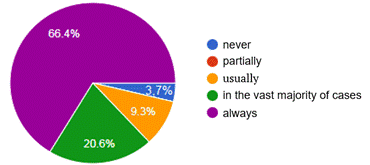
Source: prepared by the authors.
Figure 10 Frequency in which problems were resolved when the offline tutor turned to one of the course agents
Question 12 aims to analyze whether there is an interest on the part of the formative teacher of the discipline regarding the performance of the students through the activities developed by them. According to Figure 13 and Table 2, considering that 39 respondents correspond to 36.4%, 22 to 20.6%, 20 to 18.7%, 17 to 15.9%, and 9 to 8.4%, the value of 2.97 is obtained, indicating a medium level of interest of the formative teachers regarding the performance of the students in the disciplines they teach.
Table 7, with questions 13 and 14, is directly related to Knowledge Management (KM) themes regarding the identification of practices and tools, as well as existing barriers in the organizational environment.
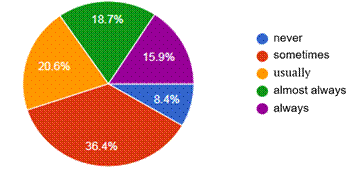
Source: prepared by the authors.
Figure 13 The interest of the teacher trainer in the performance of students in the activities developed by him or her
Table 7 KM practices and tools.
| 13. | Identify possible barriers to the execution of your activities and, consequently, the efficiency of your work. |
| 14. | Knowledge Management has techniques for sharing knowledge that directly reflect on the construction of the organization's intellectual capital. Based on your experiences, read the Knowledge Management techniques below and identify which ones you use to carry out your tasks at work. |
Source: prepared by the authors.
Barriers, practices, and tools of KM
Therefore, question 13 deals with the barriers to carrying out activities and sharing. It is observed in Figure 14 that, among the available alternatives, those that stand out are: bureaucracy or hierarchy, with 49 respondents (45.8%), and resistance from individuals involved in the process, with 40 respondents (37.4%). This leads to the perception that the development of strategies to facilitate knowledge-sharing among offline tutors can enable a change in the ways communication and knowledge-sharing processes occur within the HEI, as reported by Disterer (2001), Ipe (2003), Ghani (2009), Lenzi (2014), and Cheng and Lee (2016), among other authors, mentioning the relevance of building the organizational climate for processes and sharing among agents to happen effectively.
Question 14 provides twenty-two knowledge management (KM) methods and tools from the Asian Productivity Organization (APO, 2020) so that agents could identify which ones are present in their daily activities and intra and intersectoral relationships. The results shown in Figure 15 indicate that among the KM practices and tools aimed at knowledge sharing, those with the lower incidence among offline tutors are: 15 agents (14%) - storytelling; 17 agents (15.9%) - knowledge portal; and 17 agents (15.9%) - knowledge bases. In contrast, the practices and tools with higher incidence were: 89 agents (83%) - peer assistance; and 68 agents (63.6%) - mentoring. It is observed that, based on these percentages, the coordination of assessment tutoring and supervisors can promote dynamics that use these practices to ensure communication and knowledge sharing among offline tutors.
From all the answers presented in the questionnaire, the process of communication and sharing in the intra and intersectoral relationship from the perspective of course agents is outlined. Table 8 presents an overall diagnosis of the research results.
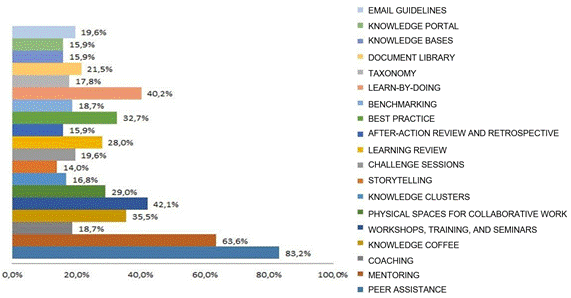
Source: prepared by the authors.
Figure 15 KM practices and tools applied in the development of activities
Table 8 Summary of the questionnaire diagnosis for course agents.
| Periodic improvements | There is a strong awareness of the relevance of regular improvements and training among course agents. |
| Teamwork between course agents | There is a strong conception of teamwork for problem-solving. This is confirmed with KM practices, peer assistance, and mentoring. |
| Adversity resolution | There is a strong relationship to resolving adversities that arise through collaborative work between course agents. |
| Relationship and sharing between offline tutors and course agents | There is a strong relationship between the offline tutor and the pedagogical tutor, in addition to the online tutor. In turn, in the relationship with the coordinator and the training teacher, this bond is average and can be enhanced. |
| Online tutor is the bridge between course agents | The online tutor is the bridge to resolving adversities. Then, the coordinator, the pedagogical tutor, and the teacher trainer appear. This is an indication that the online tutor is capable of solving certain problems. |
| Knowledge construction relationship between sectors | There is an average relationship of sharing and exchanging experiences in the development of activities between offline tutors and course agents, which could be worked on and encouraged by the HEI to improve communication. |
| Adversity resolution and collaborative work between offline tutors and agents | Even though it presents an average relationship for the construction of knowledge, there is a strong index for resolving adversities, when these are shared. |
| Agents’ interest in the performance of activities that offline tutors evaluate | There is an interest among course agents in students' performance/feedback in assessment activities, in problems/inconsistencies with the teaching material, and in the question banks. To achieve this, there needs to be a greater relationship between offline tutors and course agents. |
| Enhance sharing between offline tutor and teacher trainer | Encourage/facilitate the sharing of knowledge between the course teacher and offline tutors through periodic meetings. |
| Strategies for breaking down sharing barriers | Bureaucracy, hierarchy, and resistance on the part of the people who are part of the process prevent the sharing of knowledge between agents. |
| Sharing practices and tools between offline tutors | Among the practices presented, it was detected that mentoring, peer assistance, learning-by-doing, and physical spaces for collaborative work had a relevant percentage of acceptance by agents. |
Source: prepared by the authors.
Considering the summary presented in Table 8, what stands out is the reflection on improving/expanding the process in the intrasectoral relationship: the need for more frequent training sessions for the development of question banks in which teacher trainers, pedagogical tutors, online tutors, and coordinators should participate. Still in relation to improvements aimed at the intrasectorial process, strategies should be devised to bring the communication process of the educational institution closer to teacher trainers. In the intersectoral relationship, points were also identified aimed at developing strategies for holding regular meetings between agents and offline tutoring, to integrate sectors and, consequently, reducing bureaucracy in the communication process.
Final considerations
From the synthesis of the questionnaire diagnosis of course agents and the content analysis of their general perceptions about the communication and knowledge-sharing process, the reflection emphasizes the improvement/expansion of the intrasectoral relationship where all course agents, i.e., coordinators, online tutors, pedagogical tutors, and especially teacher trainers, should undergo question bank development training more frequently, as some inconsistencies were identified in activity development. Thus, it is necessary to devise strategies so that teacher trainers become more involved in the institution's communication process and consequently understand the sector’s progress and interaction with other departments. Since these professionals do not work at the institution every day, it is important to define strategies that integrate them more effectively into the process.
Regarding intersectoral relationships, topics contributing to the development of strategies were identified, such as: creating regular meetings between agents and offline tutoring to develop planning strategies aimed at greater integration between sectors; and developing communication techniques to reduce hierarchies in communication - for example, when offline tutors identify pedagogical inconsistencies in corrections, the bureaucratic process will consequently decrease.
However, the presented scenario was modified due to the increasing spread of the novel coronavirus. In the educational sector, higher education institutions needed to review the organization of their departments, and consequently, their processes that previously occurred in person, as they began to occur remotely with the assistance of knowledge-sharing tools.
Telecommuting became a reality for many institutions in various sectors, including education, leading to adherence to this form of work and resulting in adaptations in the communication process of the case study institution. In this sense, professionals in this institution were reallocated, and telecommuting was implemented in the evaluation department, where offline tutors responsible for activity corrections and assessment are located. Taking into account the restrictions caused by the COVID-19 pandemic, adjustments in the sectors were made. Therefore, as future work, it is suggested to update the diagnosis of this research to analyze how communication and knowledge-sharing processes occur in telecommuting.
REFERENCES
Asian Productivity Organization [APO]. (2020). Knowledge management: tools and techniques manual. Tokyo, JP: APO. [ Links ]
Bentes, R. F. (2009). A avaliação do tutor. In F. M. Litto, & M. Formiga (Orgs.), Educação a distância: o estado da arte (p. 166-170). São Paulo, SP: Pearson. [ Links ]
Bento, J. C. (2016). Análise do nível de implantação e alcance das práticas da gestão do conhecimento em instituição privada de ensino superior (Dissertação de Mestrado). Centro Universitário de Maringá, Maringá. [ Links ]
Brasil. (2007). Referenciais de qualidade para Educação Superior a Distância. Brasília, DF: MEC. [ Links ]
Calvi, G. C. (2019). O compartilhamento do conhecimento em um sistema de educação a distância: uma análise da relação intra e entre-setores (Dissertação de Mestrado). Centro Universitário de Maringá, Maringá. [ Links ]
Calvi, G. C., Almeida, I. C., & Dal Forno, L. F. (2020). A estrutura e o processo de compartilhamento do conhecimento entre agentes do sistema EAD de uma Instituição de Ensino Superior Privada. Paidéi@ - Revista Científica de Educação a Distância, 12(21), 3-24. DOI: https://doi.org/10.29327/3860.12.21-1 [ Links ]
Cheng, E. C. K., & Lee, J. C. K. (2016). Knowledge management process for creating school intellectual capital. The Asia-Pacific Education Researcher, 25(4), 559-566. DOI: https://doi.org/10.1007/s40299-016-0283-4 [ Links ]
Choo, C. W. (2006). A organização do conhecimento: como as organizações usam a informação para criar significado, construir conhecimento e tomar decisões (2. ed.). São Paulo, SP: Senac. [ Links ]
Cunha, L. M. A. (2007). Modelos Rasch e Escalas de Likert e Thurstone na medição de atitudes (Dissertação de Mestrado). Universidade de Lisboa, Lisboa. [ Links ]
Dalkir, K. (2005). Knowledge management in theory and practice. Londres, GB: Routledge. [ Links ]
Dalkir, K. (2017). Knowledge management in theory and practice (3rd ed.). Londres, GB: Routledge . [ Links ]
Disterer, G. (2001). Individual and social barriers to knowledge transfer. In 34th Hawaii Int. Conference on System Sciences (HICSS). Maui, HI: IEEE. [ Links ]
Feitosa, M. O. (2015). Importância do capital intelectual em uma instituição de ensino superior de uma cidade do nordeste brasileiro (Dissertação de Mestrado). Universidade Potiguar, Natal. [ Links ]
Fleury, M. T. L., & Werlang, S. R. C. (2016). Pesquisa aplicada: conceitos e abordagens. In Anuário de Pesquisa GVPesquisa. Recuperado de https://bibliotecadigital.fgv.br/ojs/index.php/apgvpesquisa/article/view/72796 [ Links ]
Ghani, S. R. (2009). Knowledge management: tools and techniques. DESIDOC Journal of Library & Information Technology, 29(6), 33-38. DOI: https://doi.org/10.14429/djlit.29.6.276 [ Links ]
Gil, A. C. (2010). Como elaborar projetos de pesquisa (5. ed.). São Paulo, SP: Atlas. [ Links ]
Ipe, M. (2003). Knowledge sharing in organizations: a conceptual Framework. Human Resource Development Review, 2(4), 337-359. DOI: https://doi.org/10.1177/1534484303257985 [ Links ]
Lenzi, G. K. S. (2014). Framework para o compartilhamento do conhecimento na gestão de tutoria de cursos de educação a distância (Tese de Doutorado). Universidade Federal de Santa Catarina, Florianópolis. [ Links ]
Lin, H. F. (2007). Effects of extrinsic and intrinsic motivation on employee knowledge sharing intentions. Journal of Information Science, 33(2), 135-149. DOI: https://doi.org/10.1177/0165551506068174 [ Links ]
Moresi, E. A. D., & Mendes, S. P. (2010). Compartilhamento do conhecimento em portais corporativos. Transinformação, 22(1), 19-32. [ Links ]
Nunes, C. S. (2013). O compartilhamento de conhecimento entre os agentes de um curso na modalidade EaD: um estudo de caso (Dissertação de Mestrado). Universidade Federal de Santa Catarina, Florianópolis. [ Links ]
Nunes, C. S., Pacheco, A. S. V., Nakayama, M., Melo, P. A., & Rissi, M. (2011). Criação e compartilhamento do conhecimento em EaD. Revista Novas Tecnologias na Educação, 9(1), 1-10. DOI: https://doi.org/10.22456/1679-1916.21899 [ Links ]
Sampieri, R. H., Collado, C. F., & Lucio, P. B. (2006). Metodologia da pesquisa (3. ed.). Porto Alegre, RS: AMGH. [ Links ]
Santos, I. E. (2005). Manual de métodos e técnicas de pesquisa científica (5. ed.). Niterói, RJ: Impetus. [ Links ]
Schuelter, G. (2010). Modelo de educação a distância empregando ferramentas e técnicas de gestão do conhecimento (Tese de Doutorado). Universidade Federal de Santa Catarina, Florianópolis. [ Links ]
Takeuchi, H., & Nonaka, I. (2008). Gestão do conhecimento. Porto Alegre, RS: Bookman. [ Links ]
Wiig, K. M. (1999). What future knowledge management users may expect. Journal of Knowledge Management, 3, 155-165. DOI: https://doi.org/10.1108/13673279910275611 [ Links ]
10NOTE: Gabriel Calvi, author responsible for the conception, analysis, and interpretation of data, writing, reviewing the content of the manuscript, and approving the final version to be published; Iara Carnevale de Almeida, supervisor, author responsible for critically reviewing the content of the manuscript and approving the final version to be published; Jaqueline Ganassin Rosa, collaborator, author responsible for writing, formatting and reviewing the manuscript; and Viviane Sartori, author responsible for reviewing the final version to be published
Received: December 26, 2021; Accepted: April 05, 2022











 texto em
texto em 


